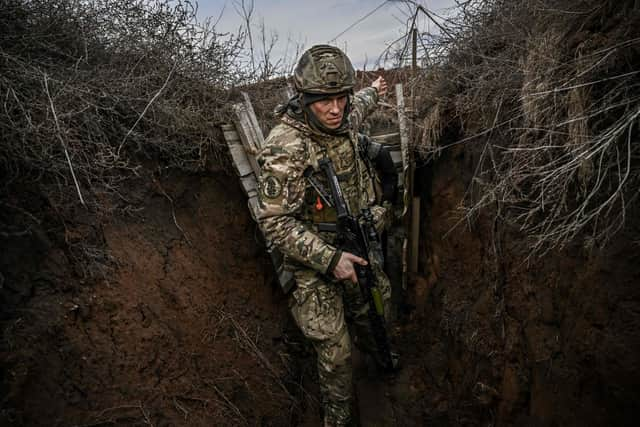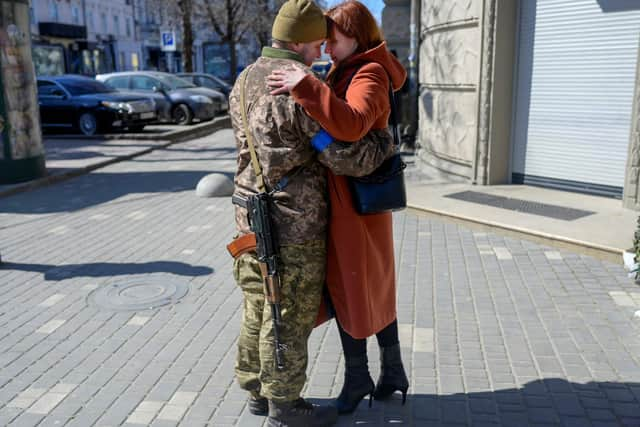Ukraine-Russia war: Fighting spirit of Ukrainian forces is so strong because their cause is democracy, the rule of law and human rights – Dr Paul Arnell
Whilst the events are almost beyond comprehension, reprehensible and utterly tragic, they also provide a critically important lesson. It is that without the rule of law and human rights, evil can flourish.
President Putin is unconstrained by law. He is a modern-day Louis XIV, who can accurately say “l’etat c’est moi”. Putin is Russia. As an example, Russia’s constitutional limits on the length of time any one person can hold the role of President have been treated with contempt.
Advertisement
Hide AdAdvertisement
Hide AdRussia’s Constitution provides that a president can serve two terms of office. Like the US constitution, a president who has been elected to office twice must step down at the end of the second term.
This sensible limitation is an attempt to prevent any one president leading too long and perhaps succumbing to the temptations of power. The well-known aphorism that power tends to corrupt and absolute power corrupts absolutely is apt here.
Putin has circumvented the law. He has served two four-year terms between 2000 and 2008 and will have served two six-year terms between 2012-2024. During the gap, Dmitry Medvedev, Putin’s chosen successor, served as president.
In 2020, a questionable referendum was held where constitutional reform was approved. Putin could remain in power until 2036. He has put himself above Russia’s constitution.
Constitutions are a form of higher law, binding upon everyone in society and the government itself. They are the supreme authority in almost all countries. Constitutions define and delimit the central institutions of the state, the executive, legislature and judiciary. They also generally contain a set of entitlements protecting all citizens from egregious state power.


Importantly, constitutions also normally contain mechanisms protecting them from easy and ill-considered amendment. As a result, they are entrenched law, designed to withstand the test of time and personal political ambitions of the leaders of the day.
Constitutions, however, rely upon the rule of law to operate as designed. One of the most complex and amorphic of doctrines, the essence of the rule of law is that both government and citizens must act in accordance with the norms lawfully enacted or concluded.
Law must govern, or rule, over everything and everyone within a country. Institutions and individuals who break the law must be liable to be held to account – whether the president, government or the man on the street.


Advertisement
Hide AdAdvertisement
Hide AdIn Russia under Putin, the rule of law is a sham. The Russian Constitution is there to be manipulated for his benefit. The institutions of the state that exist to limit and scrutinise the exercise of governmental power, the State Duma, Federation Council and the courts, are unable or unwilling to carry out their roles as designed. Putin’s power and readiness to disregard the law are simply too great.
Human rights exist alongside the rule of law as a basis of modern liberal democracies. Chapter two of the Russian Constitution contains a set of human rights that are not dissimilar to those found in many other countries. The right to life, protection from torture, the right to liberty, private life and freedom of speech are all found.
As with the rules governing presidential terms, however, there is a disconnect between the law and reality. Even before the Russian invasion, human rights defenders faced prosecution, torture was endemic and the right to a fair trial was routinely violated. Non-governmental organisations such as Amnesty International and Human Rights Watch have long provided insight into the state of human rights in Russia.
So too has the Council of Europe. Created in 1949, it is an inter-governmental organisation of 47 European countries existing to promote and protect democracy, the rule of law and human rights. Russia became the 39th member in 1996. Not surprisingly, discussions about Russia’s future in the organisation have been held.
This is a drastic step. Only Greece, following a military in coup in 1967 has previously left the organisation. It re-joined in 1974. This is different.
On Wednesday this week, the Committee of Ministers of the Council of Europe adopted a resolution deciding that Russia ceased to be a member.
Leading up to the resolution, Secretary General Marija Pejcinovic Buric described Russia’s aggression against Ukraine, one Council of Europe member state on another, as shocking and appalling.
Russia is no longer a party to the Council of Europe treaties it has ratified; most importantly the European Convention on Human Rights. Russian people will no longer be able to hold their country to account in the European Court of Human Rights.
Advertisement
Hide AdAdvertisement
Hide AdThis is a tragedy, but Russian’s continued membership was untenable. Its aggression is a serious violation of article three of the Statute of the Council of Europe, obliging members to accept the rule of law and human rights.
The position in law of Russia’s acts is clear. However, in light of the failure of Russia’s constitution, the rule of law and human rights to stop the deprivations being inflicted upon Ukraine and Ukrainians questions reasonably arise. What is the value of these legal instruments and doctrines? Is real authority found at the end of a gun or target of a missile? Are they merely window dressing?
The answer is found in the heroism and strength of Ukrainian resistance, and in autocratic Russia’s fear of a democratic Ukraine aligning with Western Europe where those ideals are held dear.
Indeed, the war is about democracy, the rule of law and human rights. Liberty and real and effectual limitations on governmental power underlie the conflict. The very values understood to be so vital following the Second World War indubitably remain so today. Shockingly, military conflict has returned to the continent in their defence.
Dr Paul Arnell, Law School, Robert Gordon University
